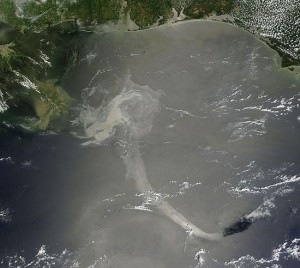 Dr. William J. Rea, founder and director of the Environmental Health Center-Dallas (EHC-D) and world renowned specialist in treating chemical injury, has been featured in several articles of late about the health effects of the BP Oil Spill on cleanup crews and local residents.
Dr. William J. Rea, founder and director of the Environmental Health Center-Dallas (EHC-D) and world renowned specialist in treating chemical injury, has been featured in several articles of late about the health effects of the BP Oil Spill on cleanup crews and local residents.
 The latest, “BP blamed for toxification” by Dahr Jamail of Al Jazeera, details how the 1.9 million gallons of toxic chemical dispersants used to break up the oil released by the explosion at one of BP’s deepwater oil rigs in the Gulf of Mexico last summer has caused a wide array of disturbing symptoms in people exposed to the chemicals. The article states “Pathways of exposure to the dispersants are inhalation, ingestion, skin and eye contact. Health impacts include headaches, vomiting, diarrhoea, abdominal pains, chest pains, respiratory system damage, skin sensitisation, hypertension, central nervous system (CNS) depression, neurotoxic effects, cardiac arrhythmia and cardiovascular damage. The chemicals are also teratogenic, mutagenic and carcinogenic.”
The latest, “BP blamed for toxification” by Dahr Jamail of Al Jazeera, details how the 1.9 million gallons of toxic chemical dispersants used to break up the oil released by the explosion at one of BP’s deepwater oil rigs in the Gulf of Mexico last summer has caused a wide array of disturbing symptoms in people exposed to the chemicals. The article states “Pathways of exposure to the dispersants are inhalation, ingestion, skin and eye contact. Health impacts include headaches, vomiting, diarrhoea, abdominal pains, chest pains, respiratory system damage, skin sensitisation, hypertension, central nervous system (CNS) depression, neurotoxic effects, cardiac arrhythmia and cardiovascular damage. The chemicals are also teratogenic, mutagenic and carcinogenic.”
Also being reported in other articles* is the onset of Toxicant-Induced Loss of Tolerance (TILT) – another name for Chemical Sensitivity, a disabling condition that makes life very difficult for sufferers who react to very low levels of chemicals, mold, and other substances. As chemical use in our culture is so ubiquitous and deeply woven into the fabric of daily life, managing the illness can be a life-long struggle. *see Gulf Coast Oil Spill Workers Falling Ill With TILT, TILT: The illness afflicting workers exposed to BP’s oil disaster?, Mysterious illness plagues Gulf oil disaster workers.
Dr. Rea is an expert on Chemical Sensitivity, having treated many thousands of patients with the condition (including those exposed to toxic chemicals in crude oil and dispersants) since his treatment center opened in 1974. Regarding the BP Oil Spill victims, Dr. Rea explains his treatment approach:
‘We first try to eliminate people’s symptoms, and that is organ specific,’ Rea explained at his clinic, which is one of the oldest and most advanced centres in the world for addressing health as it relates to the environment. ‘We try to lower their toxic load by giving them intravenous nutrients, oral nutrients, sauna, and have them live in quarters that are less polluted, eat organic food and have them get safe drinking water.’
Rea has treated many people from the Gulf that have been made sick by BP’s toxic chemicals.
‘I have multiple concerns now about people in the Gulf being affected by these chemicals,’ he said. ‘First, they are all fatigued and not able to work. When your muscles are all fatigued and tired, it’s hard to function. People are getting cloudy brains, others are having heart problems because of the chemicals. Others have broncho-spasm and asthma from this. Others bloat and get sleepy after eating, diarrhoea, constipation, irritable bowel syndrome and other gastrointestinal problems.'”
Dr. Rea stresses that it is critical to remove patients from the area of contamination in order for treatment to be effective.
In Ricki Ott’s article “BP, Governments Downplay Public Health Risk From Oil and Dispersants” published by Huffington Post last July, she reminds us that Dr. Rea treated some of the sick Exxon Valdez cleanup workers as well.
Planet Thrive is proud to host Dr. Rea’s free question and answer column and welcomes questions from those affected by the BP Oil Explosion tragedy, as well as those suffering from other forms of chemical exposure.











0 Comments